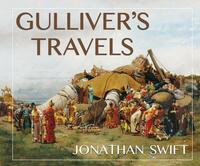Take a photo of a barcode or cover
adventurous
challenging
funny
hopeful
informative
mysterious
reflective
medium-paced
Plot or Character Driven:
A mix
Strong character development:
Yes
Loveable characters:
Yes
Diverse cast of characters:
Complicated
Flaws of characters a main focus:
Yes
I read this before as a teenager and remember liking it but could only recall a few details about the different lands that the main character travels to, but I think in rereading it I realed there's quite a bit that went over my head.
Overall Gulliver's Travels is a biting satire that finds the lead character traveling to different imaginary lands and engaging in conversations with the natives about how their society runs, and then often for extended periods explaining the nature of British society in the early 18th century.
What I didn't pick up on originally is that he attempts to paint his home country in a positive light, but continually experiences severe negative reactions to the supposed norms of the time. This causes him to grapple with his identification with England, especially as he sees so many different forms of organization, even though few seem to be ideal, either.
This seems to really be a critique of accepting the status quo in society out of powerlessness, even for a person lacking nobility. But he also begins to question how much of human life is apart of our nature rather than individual choices. Overall it was a really interesting dive into a critital thinking about social sciences after the enlightenment. It's sociology and philosophy wrapped in a story about a man lost and wandering through the far ends of globe in imaginary lands. Most people are familiar with the first story, but I definitely felt the most meaningful sections were the last two lands that he travels to.
I really enjoyed it and got a lot more out of it the second time.
Overall Gulliver's Travels is a biting satire that finds the lead character traveling to different imaginary lands and engaging in conversations with the natives about how their society runs, and then often for extended periods explaining the nature of British society in the early 18th century.
What I didn't pick up on originally is that he attempts to paint his home country in a positive light, but continually experiences severe negative reactions to the supposed norms of the time. This causes him to grapple with his identification with England, especially as he sees so many different forms of organization, even though few seem to be ideal, either.
This seems to really be a critique of accepting the status quo in society out of powerlessness, even for a person lacking nobility. But he also begins to question how much of human life is apart of our nature rather than individual choices. Overall it was a really interesting dive into a critital thinking about social sciences after the enlightenment. It's sociology and philosophy wrapped in a story about a man lost and wandering through the far ends of globe in imaginary lands. Most people are familiar with the first story, but I definitely felt the most meaningful sections were the last two lands that he travels to.
I really enjoyed it and got a lot more out of it the second time.
adventurous
reflective
slow-paced
Plot or Character Driven:
Plot
Strong character development:
No
Loveable characters:
No
Diverse cast of characters:
No
Flaws of characters a main focus:
No
WeCan you believe this story will be 300 years old next year!? It was fascinating how much of it was still very relevant. Gulliver's Travels is a satire about English colonization, religion, politics, war and culture.
Many of us have seen this story represented in a cartoon or movie adaptation, but usually they only portray the first part of the book where Gulliver is stranded in Lilliput. The locality is miniscule in comparison to Gulliver's human size.
The next part brings Gulliver to a land where HE is miniscule and the locality is enormous. Another land has a floating island where royalty lives. Yet another is populated by horses.
Gulliver learns something in each of these lands...except he never seems to learn to stay home and stop getting stranded.
I'm glad to say I have read this, and I don't think I ever need to read it again.
Many of us have seen this story represented in a cartoon or movie adaptation, but usually they only portray the first part of the book where Gulliver is stranded in Lilliput. The locality is miniscule in comparison to Gulliver's human size.
The next part brings Gulliver to a land where HE is miniscule and the locality is enormous. Another land has a floating island where royalty lives. Yet another is populated by horses.
Gulliver learns something in each of these lands...except he never seems to learn to stay home and stop getting stranded.
I'm glad to say I have read this, and I don't think I ever need to read it again.
medium-paced
adventurous
funny
lighthearted
medium-paced
I hated this book, buuut I got to see humanity from another point of view. The author's sarcasm added a lot to this story.
adventurous
challenging
dark
emotional
reflective
medium-paced
Plot or Character Driven:
Character
Strong character development:
Complicated
Loveable characters:
No
Diverse cast of characters:
Yes
Flaws of characters a main focus:
Yes
adventurous
funny
lighthearted
reflective
medium-paced
adventurous
challenging
mysterious
slow-paced
Plot or Character Driven:
A mix
Strong character development:
No
Loveable characters:
No
Diverse cast of characters:
Yes
Flaws of characters a main focus:
Complicated
adventurous
challenging
tense
medium-paced
Plot or Character Driven:
A mix
Strong character development:
Yes
Loveable characters:
No
Diverse cast of characters:
Yes
Flaws of characters a main focus:
Yes
adventurous
funny
medium-paced
Plot or Character Driven:
A mix
Strong character development:
Yes
Loveable characters:
No
Diverse cast of characters:
Yes
Flaws of characters a main focus:
Complicated





